 Society
Society

The first mission abroad of Captain Nguyễn Trọng Chiến, an infectious disease doctor, was in the war-ravaged Republic of South Sudan. He left Việt Nam for the United Nations’ peacekeeping mission in April and has been busy with the treatment and COVID-19 prevention and control work.
by Vân Nguyễn
The first mission abroad of Captain Nguyễn Trọng Chiến, an infectious disease doctor, was in the war-ravaged Republic of South Sudan. He left Việt Nam for the United Nations’ peacekeeping mission in April and has been busy with the treatment and COVID-19 prevention and control work.
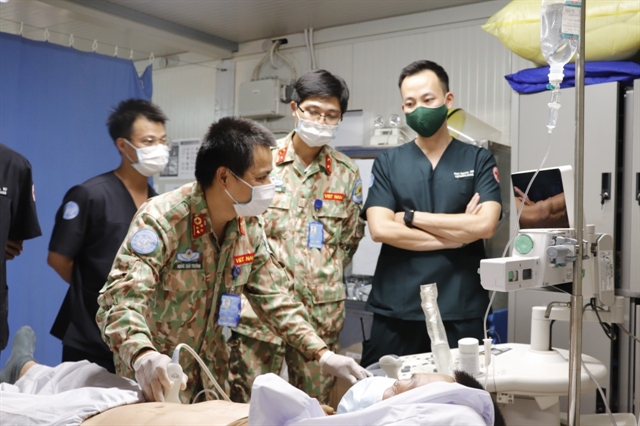
|
| Major Trần Đăng Khoa, Vice Director of Việt Nam’s Level-2 Field Hospital Rotation 3 (second, right) along with other doctors prepare for the first surgery here for a patient suffering from appendicitis. — Photo courtesy of the hospital |
Chiến is among 63 Vietnamese officers who are working at Việt Nam’s Level-2 Field Hospital Rotation 3 (L2FH3) in Bentiu, South Sudan, an oil hub with unpredictable security risks and ethnic tensions.
“Before departure, we were a bit nervous about the pandemic situation here because we hadn't known much about the situation here,"said Chiến.
"Yet we were carefully trained with professional knowledge and skills before the departure so we have been operating the hospital smoothly. The hospital rotation 2 had already had preventive procedures and set up an isolation area. We just had to follow and add on our experience to run the hospital according to the current situation."
Among more than 100 patients that the hospital Rotation 3 has received, nearly 30 were suspected COVID-19 cases. Mild cases were instructed to isolate themselves at their units or at the level-1 hospital while serious and critical cases were treated at the level-2 hospital.
Chiến and his colleagues completed several training courses in the English language, military medical expertise, politics, technical logistics, peacekeeping knowledge, survival skills, COVID-19 prevention and control from March to December last year. All officers were also vaccinated with the first dose against COVID-19.
Chiến added: “Regarding COVID-19, we were provided with knowledge and skills related to conducting testing, implementing protective measures and transferring patients.
"We also learned about infection control for COVID-19 and other infectious diseases from experts of top-notch hospitals including Chợ Rẫy Hospital and Military Hospital 175.”
They also received training on quarantine procedures for suspected cases as well as treatment for severe and critical cases from the National Hospital for Tropical Diseases.
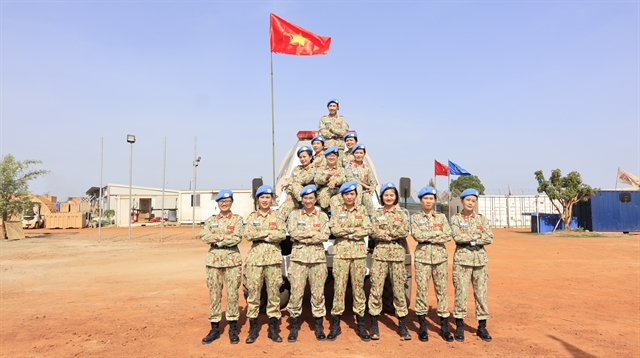
|
| More than 60 Vietnamese officers are working at the hospital based in South Sudan. |
"As vaccines have been made available, inoculations will be an important part in the pandemic prevention and control strategy at the hospital," Major Trần Đăng Khoa, Vice Director of the hospital told Việt Nam News.
Vaccination programme
The hospital will be in charge of vaccinating 500 individual UN personnel and support other units in vaccinations as well as monitor post-vaccination reactions and manage any complications from all level-1 hospitals in compound, according to Khoa.
Other units include police and military forces and delegates from Ghana, Mongolia, Cambodia, Pakistan, and India. Before these units implement the inoculation programme, the L2FH3 will supervise the procedures and offer support if needed.
“Besides online training from the World Health Organization and standard procedures from the United Nations, we also learned from Việt Nam’s experience,” said Captain Đinh Văn Hồng, head of the aeromedical evacuation team.
To prepare for the programme, the hospital set up a steering committee on vaccination and a vaccination area.
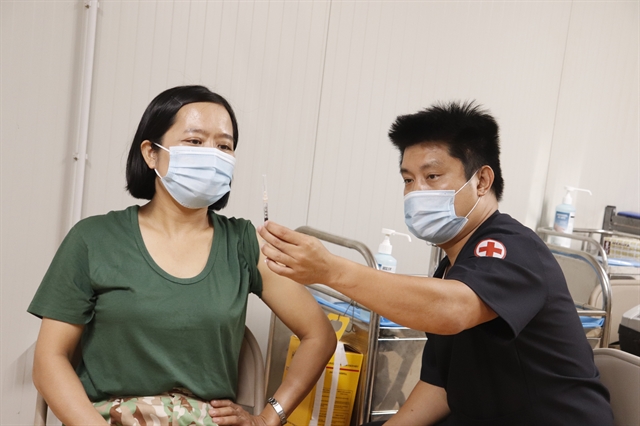
|
| The hospital will vaccinate 500 individual UN personnel, monitor reactions and manage complications after vaccinations for all UN staff. |
Among 48 people vaccinated at the hospital, there are two cases with severe reactions. One of them had coughing, difficult breathing, vomiting and a rash over their whole body. The other had extreme reaction called Stevens-Johnson syndrome (SJS). The latter is rare because there are no studies linking COVID-19 vaccines to SJS.
“We follow the treatment regime of WHO and based on SJS treatment at the Military Hospital 175. Both cases were treated promptly and discharged from the hospital soon after that,” said Hồng.
“With a total of 3,000 UN staff to be vaccinated by July, the number of cases with reactions after being vaccinated will be large but with the capacity of the hospital and knowledge of the doctors, we will be ready for the upcoming vaccination program in July.”
Preventive strategies
Besides vaccinations, the hospital will keep the COVID-19 preventive strategies the same with the previous term.
All staff are provided with knowledge about the pandemic and skills to detect suspected cases so that the operation is smooth in every single step of the whole procedures, according to Chiến.
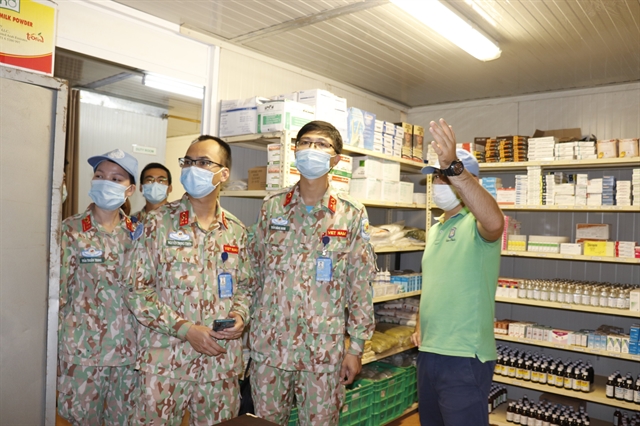
|
| Vietnamese doctors visit Pakistan's Level-1 Field Hospital. |
Screening is also crucial in detecting suspected cases and is done right from the entrance gate, which is similar to many hospitals in Việt Nam.
Visitors and patients are provided with hand sanitisers, required to wear face masks and fill in the health declaration form and undergo general health checks. If the patient is infected with a contagious disease, they will be transferred to a special area, otherwise, they will be sent to the outpatient department.
“We have a team of a doctor and two nurses in Personal Protective Equipment (PPE) who are always ready to receive infected and suspected cases. Here they have rapid COVID-19 testing with a testing machine from the UN,” Chiến said.
“Controlling infection during the treatment of patients is also important. Our target is to minimise the risk of transmission between our staff and patients, and among patients,” the doctor added.
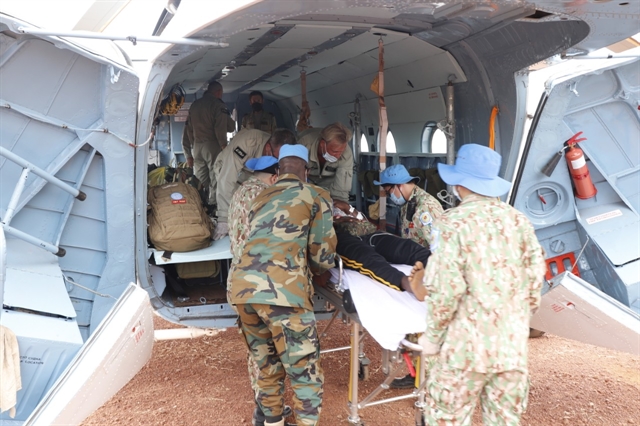
|
| A patient is transported for emergency treatment via air. |
The 5K message of Vietnamese Ministry of Health is also applied here. They are Khẩu trang (wear face masks), Khử khuẩn (conduct disinfection), Khoảng cách (maintain distance), Không tụ tập (avoid gathering) and Khai báo y tế (submit health declaration).
“We have been strictly implementing preventive measures for not only COVID-19 but other dangerous infectious diseases including Ebola, cholera, and typhoid,” he said. — VNS
Việt Nam’s Level-2 Field Hospital Rotation 3 Term: 12 months Base: Bentiu, South Sudan Staff: 63 staff, including 19 doctors, 16 non-medical staff working in departments including executive board and logistic, three pharmacists, 25 nurses and technicians. Main task: serve and treat staff of the United Nations. They also offer treatment for local people on humanitarian ground. Departments: outpatient department, internal and infectious disease department, surgery department, pharmacy and medical equipment department, aeromedical evacuation team, logistic department. Number of patients: more than 100 patients, of which four were transported for emergency treatment by airway and two underwent successful surgery. |
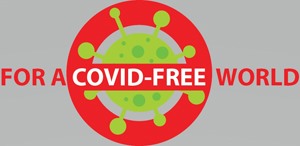
|




